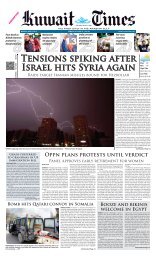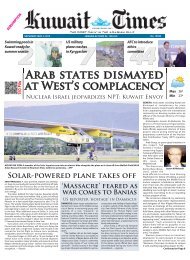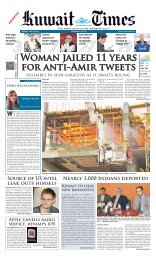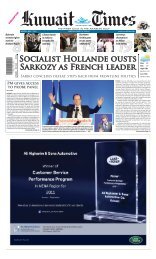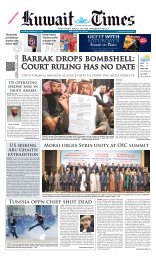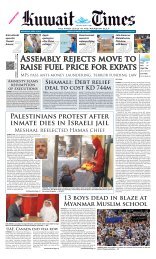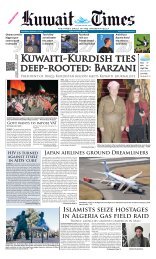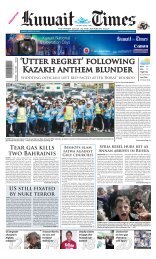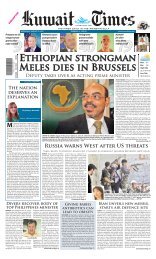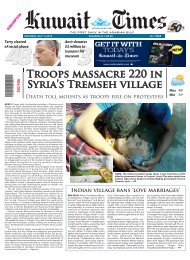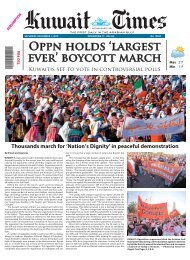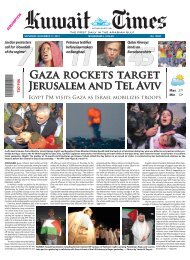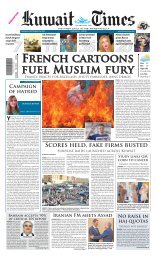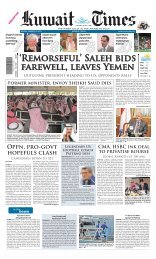You also want an ePaper? Increase the reach of your titles
YUMPU automatically turns print PDFs into web optimized ePapers that Google loves.
FRIDAY, AUGUST 31, 2012<br />
International<br />
Former rebel bastion now battleground in Angolan vote<br />
HUAMBO: Once the stronghold of the feared Unita<br />
rebels, Angola’s second city Huambo has emerged<br />
as a key battlefield in Friday’s general elections as<br />
the party struggles in politics to regain its territory.<br />
“This year the battle is going to be competitive. The<br />
ruling party is no longer certain of easy victory, and<br />
its historic rival needs to prove that it can still<br />
mobilise” its supporters, said Alicerces Mango, a<br />
local official with the new Casa opposition party.<br />
Huambo resonates with symbolism from the 27year<br />
civil war. As the stronghold of the Union for the<br />
Total Independence of Angola (Unita), the city of<br />
400,000 people suffered some of the war’s most<br />
crushing battles. The southern city infamously lived<br />
under siege for 50 days. After the war, Huambo was<br />
left devastated.<br />
It finally fell to President Jose Eduardo dos Santos<br />
and the ruling MPLA in 2008 elections, when the<br />
People’s Movement for the Liberation of Angola<br />
won the province’s five seats in parliament. That vic-<br />
MOMBASA: Local tourists walk at the Kenyatta public beach yesterday. — AFP<br />
Kenyan prez visits<br />
riot-hit port city<br />
MOMBASA: Kenyan President Mwai<br />
Kibaki arrived in the port city of<br />
Mombasa yesterday after days of violence<br />
sparked by the killing of a radical<br />
Muslim cleric, as authorities insisted<br />
security has been restored. Hundreds of<br />
armed security officers have been<br />
deployed in Mombasa to quash stonethrowing<br />
rioters who took to the streets<br />
in their hundreds following the assassination<br />
of preacher Aboud Rogo<br />
Mohammed on Monday.<br />
“We have tightened security, we<br />
have enough security forces,” said<br />
regional police chief Aggrey Adoli,<br />
speaking a day after attackers hurled a<br />
grenade at a police truck, wounding at<br />
least four officers. “We have not had<br />
problems today.” The attack, in which<br />
the Red Cross said one person was<br />
killed, was the second such blast since<br />
riots broke out on Monday, with an earlier<br />
grenade killing three policemen on<br />
Tuesday.<br />
Kibaki flew to Mombasa to open an<br />
agricultural trade fair, a longstanding<br />
engagement, but one which is also<br />
viewed as a government effort to show<br />
confidence in security in the city,<br />
Kenya’s main port and a key tourist<br />
hub. For two days, angry youths fought<br />
running battles with police, looting<br />
churches and torching cars. But Muslim<br />
leaders said yesterday the situation had<br />
improved, with many businesses closed<br />
during the rioting now open. “Things<br />
are much calmer after last night’s house<br />
to house searches by the police...<br />
Mombasa is slowly returning to normal,”<br />
said Khalid Hussein, head of the<br />
local organisation Muslims for Human<br />
Rights. “All we can do is pray that police<br />
do not go out on a revenge mission<br />
since some of their own have fallen victim<br />
to the violence. This might provoke<br />
the rioters again.”<br />
The murdered cleric-popularly<br />
known as Rogo-was on US and UN<br />
sanctions lists for allegedly supporting<br />
neighbouring Somalia’s Al-Qaedalinked<br />
Shebab militants. Rogo had<br />
fiercely opposed Kenya’s invasion of<br />
southern Somalia last year to attack<br />
Shebab bases. The United States and<br />
United Nations had accused him of<br />
recruiting and fundraising for the<br />
extremist insurgents.<br />
Prime Minister Raila Odinga on<br />
Wednesday visited Mombasa, where he<br />
called for the nation to come together<br />
to stop religious violence. “We are not<br />
going to allow outside forces to incite<br />
Kenyans to create religious war,”<br />
Odinga said, after meeting with religious<br />
leaders from the majority-Muslim<br />
region, which also has a significant<br />
Christian population. Foreign<br />
embassies-including those of Australia,<br />
Britain, France and the United Stateshave<br />
issued travel warnings for<br />
Mombasa, where several large tourist<br />
resorts are based. —AFP<br />
tory more than anything exposed the frailty of Unita<br />
as an opposition party, without its notorious leader<br />
Jonas Savimbi who was killed by the army in 2002.<br />
Unita took only 10 percent of the ballots in 2008.<br />
“Today we are better organised,” said Liberty<br />
Chiyaka, Unita’s provincial secretary. “We have visited<br />
all the villages to explain that their vote is secret.<br />
We will have two party representatives at each<br />
polling station, and will do our own compilation of<br />
the results.” “Unlike in 2008, we can monitor the<br />
vote, and we will do everything to minimise the<br />
impact of fraud,” he said.<br />
Unita has used its campaign to underscore worries<br />
about the election, from the integrity of the voter<br />
roll to the MPLA’s use of public resources-especially<br />
the broadcast media-in its campaign. The party<br />
faces other challenges from within. Top Unita<br />
leader Abel Chivukuvuku split away in April to form<br />
the new Casa party with a top MPLA figure and a<br />
clutch of smaller opposition parties.—AFP<br />
LONDON: The British government has stripped a<br />
London university of its right to sponsor visas for overseas<br />
students, leaving 2,000 of students facing possible<br />
deportation. London Metropolitan University had<br />
its Highly Trusted Status-which allowed it to sponsor<br />
visas for students from outside the European Unionrevoked<br />
by the UK Border Agency on Wednesday over<br />
alleged failings in its procedures.<br />
The move means current overseas students have<br />
60 days to enrol on a course elsewhere, with more<br />
than 2,000 students facing deportation if they fail to<br />
find another university, according to the National<br />
Union of Students (NUS). The union warned of “catastrophic”<br />
effects on Britain’s industry for educating<br />
students from overseas, which was estimated last year<br />
to be worth £14 billion (17.7 billion euros, $22.2 billion).<br />
Almost 300,000 non-EU foreign students were<br />
enrolled in Britain in the 2010-11 academic year. The<br />
university said on its website: “The implications of the<br />
revocation are hugely significant and far-reaching...<br />
Our ABSOLUTE PRIORITY is to our students, both current<br />
and prospective, and the University will meet all<br />
its obligations to them.”<br />
Immigration minister Damian Green told BBC radio<br />
that after an audit lasting six months, the Border<br />
Agency found “a serious systemic failure where it<br />
appears that the university doesn’t have the capacity<br />
to be a proper sponsor”. He said that a quarter of students<br />
there lacked permission to stay in the country,<br />
while there was insufficient evidence that students<br />
spoke English and no proof that half of those enrolled<br />
had been attending lectures.<br />
But he sought to reassure prospective students<br />
that “this will not be replicated across the university<br />
sector”. The government had formed a task force to<br />
assist current students whose visas are set to be<br />
revoked, he added. The NUS labelled the move political,<br />
linking it with promised immigration quotas<br />
brought in by Prime Minister David Cameron’s government.<br />
It said it had contacted Cameron to “express anger<br />
at the way decisions have been made in recent weeks<br />
and to reiterate the potentially catastrophic effects on<br />
higher education... as an export industry”. A Border<br />
Agency spokesman said: “The latest audit revealed<br />
problems with 61 percent of files randomly sampled.<br />
Allowing London Metropolitan University to continue<br />
to sponsor and teach international students was not<br />
an option.<br />
LUANDA: National Union for the Total Independence of<br />
Angola (UNITA) supporters react as they listen to a speech<br />
of their leader Isaias Samakuva (unseen) during the final<br />
rally campaign. — AFP<br />
2,000 students at risk<br />
of deportation from UK<br />
‘Problems with one university, not whole sector’<br />
“These are problems with one university, not the<br />
whole sector.” London Metropolitan is in the top 20<br />
British recruiters of international students, with 6,000<br />
EU and non-EU overseas students in 2010-11, according<br />
to government figures. It said it was working<br />
closely with bodies including the Border Agency to try<br />
to resolve the problems. — AFP<br />
Killer wants Punk<br />
Riot freed: Russia<br />
MOSCOW: The bodies of two slain women were<br />
found in Russia beneath a scrawled message<br />
demanding freedom for the jailed members of the<br />
Punk Riot band, officials said yesterday. While a<br />
Russian investigator cautioned that the killer was<br />
possibly trying to mislead police by drawing attention<br />
to the punk provocateurs, the alleged link<br />
between a killer and anti-Putin protesters was<br />
immediately seized upon by Russian media and pro-<br />
Kremlin publicists. Some publications ran headlines<br />
claiming that Punk Riot supporters “committed” or<br />
“inspired” a double homicide. The coverage was full<br />
of the mostly negative terms used by Kremlinfriendly<br />
television networks and media in their coverage<br />
of the protesters’ trial.<br />
A Moscow court earlier this month sentenced<br />
three Punk Riot members to two years in jail for performing<br />
a “punk prayer” against President Vladimir<br />
Putin at a Moscow cathedral in February. The trial,<br />
widely seen as Kremlin-orchestrated, caused an<br />
international furor, with celebrities such as Paul<br />
McCartney urging Russian authorities to free the<br />
band. The jailed band members’ attorney said on<br />
Twitter that “what happened in Kazan is horrible,”<br />
calling the case “either a horrendous provocation or<br />
a psychopathic” case.<br />
“I am sorry that some freaks are using Punk Riot’s<br />
band name,” Nikolai Polozov was quoted by the<br />
Interfax news agency as saying. Russia’s<br />
Investigative Committee said the women, aged 76<br />
and 38, were killed late last week in their apartment<br />
in the central city of Kazan with the words “Free<br />
Punk Riot” written on the wall in English, “presumably”<br />
with blood.—AP



